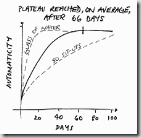 It’s a working week from the road, ranging from Braintree to Poole, London to Reading. I need to moderate work and travel, getting back into healthier habits by February. So I’m making an effort to stay off email before 9, on the bike after 5, and to cook regular meals in the evenings. I’m reading again, catching up with articles pushed into Pocket during my travels and popping Baldacci spy novels downloaded from the library at bedtime.
It’s a working week from the road, ranging from Braintree to Poole, London to Reading. I need to moderate work and travel, getting back into healthier habits by February. So I’m making an effort to stay off email before 9, on the bike after 5, and to cook regular meals in the evenings. I’m reading again, catching up with articles pushed into Pocket during my travels and popping Baldacci spy novels downloaded from the library at bedtime.
‘Among the interesting bits bobbing up so far:
 HIIT Training: The New York Times has been advocating High Intensity Interval Training (HIIT), periods of extremely intense activity alternated with brief periods of recovery. The workout is supposed to promote strength and endurance – I would hope to be able to use it as a travel-friendly routine that accelerates my (re)conditioning
HIIT Training: The New York Times has been advocating High Intensity Interval Training (HIIT), periods of extremely intense activity alternated with brief periods of recovery. The workout is supposed to promote strength and endurance – I would hope to be able to use it as a travel-friendly routine that accelerates my (re)conditioning
I’ve adapted it midway into my hour’s biking as 30 seconds on / 1 minute off, repeated ten time. It boosts my heart rate towards 160 and the calories expended by 20% during a 50% increase (60 –> 90 rpm) in effort. I wish that the bike could show how progressive and sustained the bursts are: I can only gauge that it’s difficult to maintain the intensity by the seventh rep.
And no, that’s not me (yet) in the graphic.
 Keeping Friends: Gerald Mollenhorst, a social psychologist in Utrecht, reported five years ago that while the size of people’s social networks are remaining constant, the composition of their close relationships are changing more quickly. On average, half of a person’s close friends would likely be replaced by new ones within seven years, mostly driven by a lack of meeting opportunities.
Keeping Friends: Gerald Mollenhorst, a social psychologist in Utrecht, reported five years ago that while the size of people’s social networks are remaining constant, the composition of their close relationships are changing more quickly. On average, half of a person’s close friends would likely be replaced by new ones within seven years, mostly driven by a lack of meeting opportunities.
In particularly Dutch context, Mollenhorst also looked at implications for neighborhoods, finding that “locale has not lost relevance to its residents”. Neighbor networks have changed, becoming more superficial, contacts more about holding a ladder than discussing important personal matters. But for the Dutch elderly, non-movers and home-owners, neighbors are more, not less, important parts of their voluntary personal networks.
The flip side would be that tumbleweeds and expats would tend to become more isolated by their lifestyles. So, as practical advice, here are pointers for Dutch friendships.
Forming habits: Conventional wisdom holds that actions repeated for 21 days become habitual. That’s actually a distortion, derived from 1950’s research that surgical patients accepted their new self-image within three weeks. A recent study suggests that new habits actually set over 84 days, with lots of individual variation averaging to 66 days. Happily, an occasional lapse in maintaining a new habit didn’t affect its consolidation.
Business self-help writers are breaking this into a series of tasks and milestones. I find that it’s more just simple practice: do it regularly until it becomes second nature, then celebrate with a good shared reward when its taken hold.
 Finding perfection: Many activities in life involve searching, for a best product, solution, maybe a partner. How much must you search, and how do you know when to stop? The BBC asked mathematician Matt Parker for a suggestion, and he advanced one from probability: the Optimal Stopping Problem.
Finding perfection: Many activities in life involve searching, for a best product, solution, maybe a partner. How much must you search, and how do you know when to stop? The BBC asked mathematician Matt Parker for a suggestion, and he advanced one from probability: the Optimal Stopping Problem.
Suppose that you figured that you could get to know 100 potential partners and wanted to decide when to stop and have a long-term relationship with a likely ‘best’ one. (Note: this is his example, not mine).
Start with a sample of the whole (n) people, sqrt(n), therefore consisting of 10 of the 100. Date them, and rank them so that you know who was best in that group. The optimal strategy would then be to continue meeting people until the first one came along who was better than that, then stop.
There are other strategies that might be tried, and there was a lively discussion on Radio 4 about whether there could be any general mathematical rules governing human relationships.

